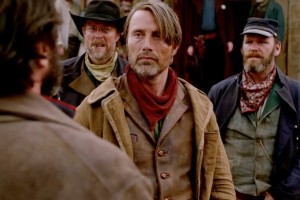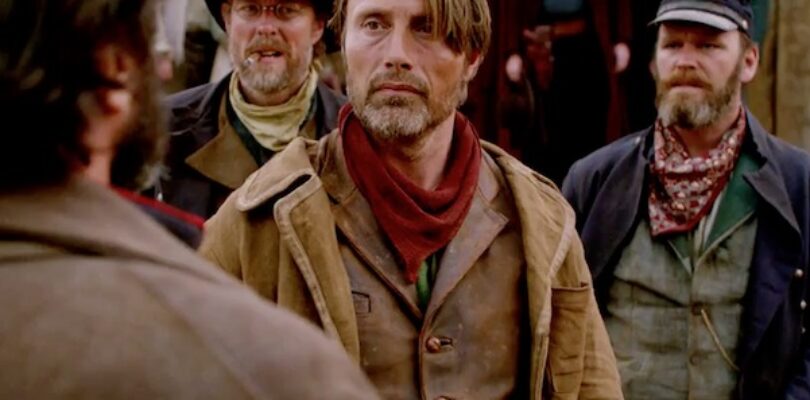
| Producer: | Michael Auret and Sisse Graum Jorgensen |
| Release Date: | February 27, 2015 |
| Starring: | Mads Mikkelsen, Eva Green, Jeffrey Dean Morgan, Jonathan Pryce |
| User Rating: | |
| Writer: | Anders Thomas Jensen and Kristian Levring |
| MPAA Rating: | R |
| Director: | Kristian Levring |
| Distributor: | IFC Films |
| External Info: | http://www.ifcfilms.com/films/the-salvation |
The Salvation is a revenge film so obsessed with the “revenge” part of its plot that you can practically feel the filmmakers salivating to get to the cathartic final shootout. (And yes, a better title for it might be The Salivation. This writer is self-respecting enough not to lead with that zinger, but not above putting it in a self-aware aside.) In so doing, the film makes for a rather pointed lesson in making a good revenge movie: sure, the revenge itself had better be big and it had better be bloody, but it needs to be truly cathartic – a release of emotional energy 
The film opens in the 1870s, when a Danish settler’s (Mads Mikkelsen) wife and son join him in America for the first time. It’s been a long time since the settler, Jon, has seen them; his boy doesn’t even remember him and must be introduced to him for the first time. Moments later, the wife and child are brutally murdered by a couple of nasty customers on a stagecoach; moments after that, Jon catches up to the nasty customers and brutally murders them. Turns out one of the nasty customers had an even nastier brother named Delarue (Jeffrey Dean Morgan), a vicious gang leader who runs a nearby town with an iron fist. Delarue mounts a manhunt that quickly locates Jon, subjecting him to various abuses as punishment for his righteous crime.
The film becomes, in a way, a dual revenge story. Delarue seeks vengeance for his brother’s killing, while Jon seeks retribution for his family’s killings, and eventually for the wrongs Delarue perpetrates against him as a result. But as an audience we find precious little reason to believe in, or care about, either one of these characters. Although Morgan plays Delarue with a nicely subdued menace, the character is written as a ridiculously over-the-top sadist. In one early scene, he calmly executes a pathetically protesting drunk man and an old woman just to make a point.
For his part, Mikkelsen is consistently a captivating actor, naturally possessed of a weather-beaten yet handsome face and eyes that look as though they’ve seen things whether he’s acting or not. He’s reliable as ever here, as a character considerably more 
Sure, when director and co-writer Kristian Levring gets to the final showdown, it’s well-staged and well-paced. But the enthusiasm Levring throws into the climax just doesn’t match what’s come before. It’s as if he slogged through all that other setup stuff just so he could get to this one scene. It’s difficult, too, to ignore the awful CGI flames that show up in one protracted segment of that final battle – but in a way, the glaring visual flaw suggests the interesting B-movie that could have been. If Levring had embraced the limitations of his filmmaking a little more, embraced the inherent outrageousness of some of his material, it’d be a lot easier to enjoy The Salvation. But Levring is so doggedly assured of his material’s dramatic weight that he misfires almost from the first shot.[box_info]WHERE TO WATCH (powered by JustWatch)
[/box_info]

